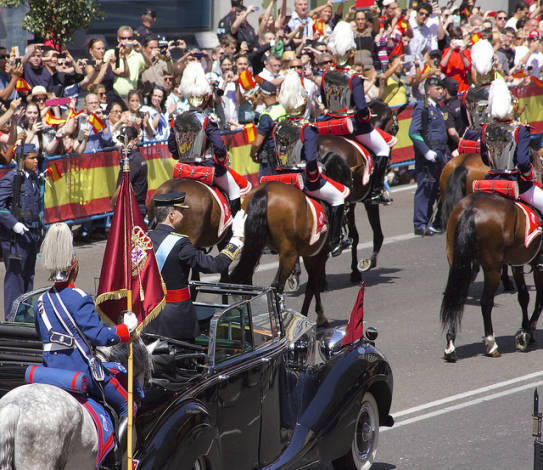MADRID, SPAIN. July 19, 2014, marked a major point in history for Spanish citizens, as King Juan Carlos I stepped down from the thrown and his son, Felipe VI, was crowned the new King.
For the first time in the history of Spain, the coronation of a new monarch took place without a religious ceremony and wasn’t be attended by foreign leaders and royalty. Consequently, the Coronation was a small, but beautiful ceremony.
With the hush of plans and lack of attendance from other royalty and King Juan Carlos I himself, the coronation event in itself wasn’t the biggest issue. Immediately following the announcement of the abdication of King Juan Carlos I, an estimated 20,000 Spaniards protested in Puerta del Sol, sporting the colors red, yellow and purple (symbolizing the former Spanish Republic) and asking for a referendum of the current monarchy, in contrast to the tens of thousands of monarchy supporters gathered at the Coronation.
In the end, however, these protests did not lead to an actual referendum. According to a Fox News article, if the referendum would have taken place, protestors in the movement would have been asked to answer yes or no to two questions: whether they agree that the head of Spain should be elected and if they agree that a constitutional process should be opened so that citizens can decide how the Spanish state is governed. About 60 polling stations staffed by volunteers would be set up along major streets in cities across the country with voting also taking place online.
Local, Héctor Angel, a 24 year-old student, says he could see the divide in the citizens of Spain. “The economic crisis and the unsustainability of the monarchy in Spain is very evident because of the hard times the people are going through,” Angel said. “I would say the reaction of maybe a 25% of the Spanish people has been against the coronation and the monarchy, another 25% has been in favor and the other 50% are just being indifferent to the situation.
However, according to a recent poll from El País, 62% of Spaniards believe a referendum on the monarchy should be held ‘‘at some point.’’ Nearly half said they would prefer a monarchy headed by Prince Felipe VI, while 36% would support a republic.
As the Spanish Parliament continues to grow, these deep roots under a new king, the government will continue to face opposition from Spanish citizens. Yet, many were happy with the coronation of Prince Felipe VI. Tens of thousands gathered on the streets or in their homes to watch the Coronation and to celebrate a new King of Spain. Plaza Oriente was filled with Spaniards waving Spanish flags.
In response to the referendum movement, Prime Minister Mariano Rajoy said, “Spain is a parliamentary monarchy with deep roots because Spaniards want it to be so.”
Retired local Eulali Anaya, 74, said, “I thought the Coronation ceremony was wonderful. King Juan Carlos I is a beautiful man and so is his whole family. I am excited for the new King Felipe VI.”
Although the referendum movement may not have taken off, crowned King Felipe IV greeted his Kingship with an understanding of all sides and began his reign with the words: “This is the start of a renewed monarchy for a new time.”
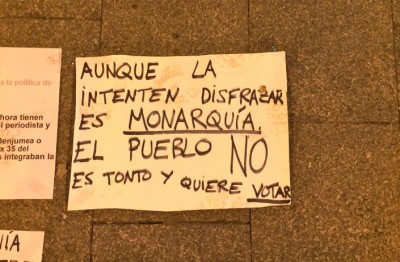
A few gather in Puerta del Sol to post signs of their protests
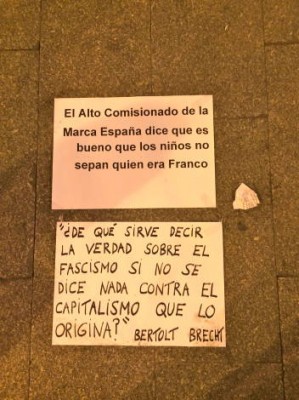
A few gather in Puerta del Sol to post signs of their protests
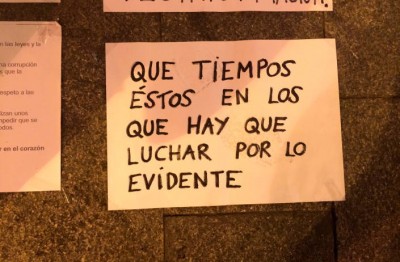
A few gather in Puerta del Sol to post signs of their protests
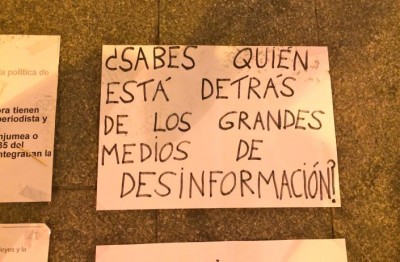
A few gather in Puerta del Sol to post signs of their protests
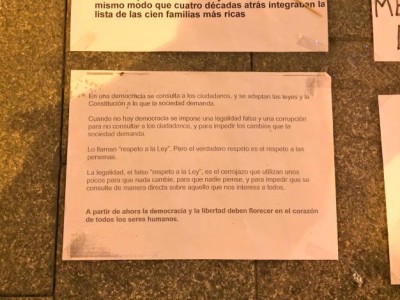
A few gather in Puerta del Sol to post signs of their protests
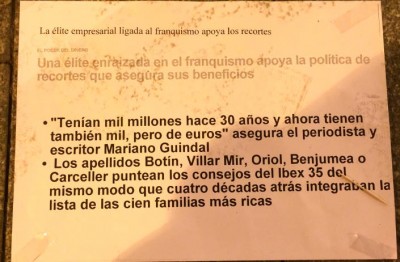
A few gather in Puerta del Sol to post signs of their protests

